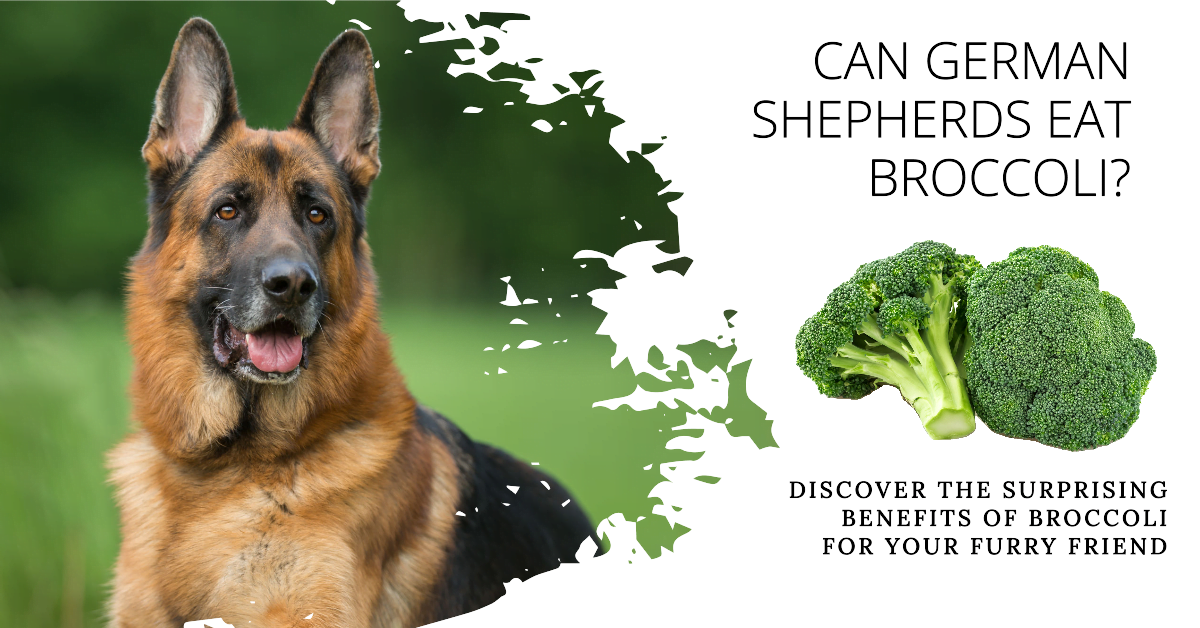As caring pet owners, we strive to provide them with the best nutrition. But when it comes to sharing our healthy plates, questions arise about what’s safe for our canine friends. In this comprehensive guide, we’ll delve into the world of canine nutrition to answer a crucial question: Can German Shepherds eat broccoli? We’ll explore the benefits, potential risks, and proper ways to incorporate this green veggie into their diet for a healthier and happier four-legged friend.
Can German Shepherds Eat Broccoli?
Yes, German Shepherds can eat broccoli, but it should be in moderation and prepared properly. It can offer some nutritional benefits but also comes with potential risks.
When it comes to sharing your plate with your German Shepherd, broccoli raises some questions. Let’s delve into whether it’s safe and beneficial for your furry friend to munch on these miniature trees.
Benefits of Broccoli for German Shepherds
1. Nutrient-Rich
Broccoli is like nature’s multivitamin for your German Shepherd. It’s bursting with vital vitamins and minerals. For example, it’s loaded with vitamin C, which does wonders for their immune system and helps their body absorb other nutrients. Plus, there’s vitamin K in there too, which is like a superhero for blood clotting and keeping those bones healthy and strong.
2. Fiber for Digestion
Broccoli isn’t just about the vitamins; it’s got your pup’s tummy covered too. It’s a great source of dietary fiber, which is like a gentle broom for their digestive system. This fiber keeps things moving regularly, which is especially handy for preventing constipation in those big German Shepherds.
3. Antioxidants for Health
Think of broccoli as a shield against the bad guys. It’s packed with antioxidants like beta-carotene and selenium. These little warriors take on free radicals, which are troublemakers that can lead to all sorts of health issues. So, broccoli is like a bodyguard for your German Shepherd’s overall well-being.
4. Low in Calories
For dog owners concerned about their German Shepherd’s weight, broccoli is a valuable treat option. It’s low in calories, making it a healthier alternative to some commercial dog treats.
5. Bone Health
Broccoli also provides calcium and phosphorus, essential minerals for strong bones and teeth. This is particularly beneficial for German Shepherds, as they are prone to certain orthopedic conditions.
Risks of Feeding Broccoli
Feeding broccoli is not mainly risky for German Shepherds but there are some points to keep in mind feed safely to German Shepherd.
1. Digestive Upset
Feeding broccoli to your German Shepherd can sometimes lead to tummy troubles. You see, broccoli is pretty high in fiber, which is good for digestion in reasonable amounts. However, if your pup goes overboard, it might result in gas, bloating, or even an upset stomach with some unpleasant diarrhea.
2. Choking Hazard
These furry friends aren’t always the best at chewing their food properly, especially when they’re excited about a broccoli treat. That’s why it’s crucial to cut the broccoli into small, easy-to-chew pieces. This reduces the risk of them choking on those crunchy florets.
3. Oxalates Concern
Now, broccoli contains something called oxalates. They’re natural compounds that, in rare cases, could contribute to kidney stones, especially in dogs prone to this issue. But don’t worry too much; the risk is generally quite low.
How to Safely Feed Broccoli
1. Moderation is Key
The key to safely incorporating broccoli into your German Shepherd’s diet is moderation. While it offers nutritional benefits, it should be a small part of their overall diet. Typically, a few small florets as an occasional treat or addition to their meal is sufficient.
2. Proper Preparation
It’s crucial to prepare broccoli for your dog by cooking it. Raw broccoli can be tough to digest and may cause digestive upset. Lightly steam or boil the broccoli until it’s soft but not mushy. This makes it easier on your dog’s stomach.
3. Chop into Small Pieces
German Shepherds, known for their enthusiasm at mealtime, may not always chew their food thoroughly. To prevent choking hazards, cut the broccoli into small, bite-sized pieces. This ensures that they can comfortably chew and swallow it.
4. Monitor for Reactions
After introducing broccoli into your dog’s diet, keep a close eye on them. Watch for any signs of digestive distress like gas, bloating, or diarrhea. Should you observe any unfavorable responses, consider reducing or entirely removing broccoli from your German Shepherd’s diet.
5. Balance Their Diet
Remember that broccoli should be a supplement to their balanced dog food, not a replacement. Ensure their overall diet meets their nutritional needs and consult with your veterinarian if you have any concerns or questions about their diet.

Can German Shepherd Puppies Eat Broccoli
Feeding broccoli to German Shepherd puppies is not advisable due to their developing digestive systems. Puppies have specific dietary needs, and introducing certain foods, like broccoli, may lead to digestive upset or difficulties in processing the fiber content. It’s crucial to focus on a balanced and specially formulated puppy diet recommended by veterinarians, ensuring that their nutritional requirements are met for healthy growth and development. As a general rule, it’s best to avoid offering human foods to puppies.
5 Other Vegetables for German Shepherds
- Carrots: Carrots are not only crunchy and delicious but also rich in beta-carotene, promoting good vision and a healthy immune system. They make for a low-calorie and high-fiber snack, aiding digestion.
- Sweet Potatoes: Packed with vitamins A and C, sweet potatoes are an excellent choice for German Shepherds. These root vegetables offer energy, support vision, and contribute to a shiny coat.
- Pumpkin: Pumpkin is a versatile vegetable for dogs. It’s loaded with fiber, aiding digestion, and can be beneficial for gastrointestinal health. Additionally, it provides essential vitamins like A and C.
- Cucumbers: Cucumbers are hydrating and low in calories, making them an ideal treat for German Shepherds. They also contain vitamins K and C, contributing to overall health and well-being.
- Green Beans: A great source of vitamins and minerals, green beans are low in calories and high in fiber. They can be served fresh, steamed, or even frozen for a crunchy treat
Related Post
FAQS
It’s generally not recommended to feed German Shepherds broccoli soup, as it may contain ingredients like spices, dairy, or excessive salt, which can be harmful to dogs. Stick to plain, cooked broccoli for your dog.
Yes, German Shepherds can eat broccoli leaves in moderation. Make sure they are free from pesticides and thoroughly cleaned. However, the primary focus should be on the florets as they provide the most nutritional value.
While plain, cooked broccoli in small amounts is safe for German Shepherds, broccoli bread may contain additional ingredients like flour, yeast, or additives that aren’t ideal for dogs. It’s best to avoid offering broccoli bread and stick to plain, cooked broccoli as a treat. Always monitor for any adverse reactions.
Conclusion
German Shepherds can eat broccoli in moderation, but caution is key. While broccoli offers valuable nutrients, its high fiber content can lead to digestive issues if overindulged. The risks of choking and oxalate concerns should be considered. Safely incorporating broccoli involves proper preparation, portion control, and vigilant monitoring for adverse reactions. While it can be a nutritious addition to their diet, consulting with a veterinarian ensures that your furry friend’s nutritional needs are met without compromising their well-being. Remember, a balanced and varied diet is the cornerstone of a healthy and happy German Shepherd.

